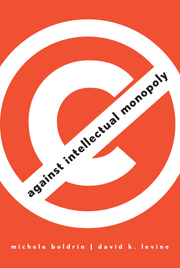Book contents
- Frontmatter
- Contents
- Acknowledgments
- 1 Introduction
- 2 Creation under Competition
- 3 Innovation under Competition
- 4 The Evil of Intellectual Monopoly
- 5 The Devil in Disney
- 6 How Competition Works
- 7 Defenses of Intellectual Monopoly
- 8 Does Intellectual Monopoly Increase Innovation?
- 9 The Pharmaceutical Industry
- 10 The Bad, the Good, and the Ugly
- References
- Index
- Plate Section
1 - Introduction
Published online by Cambridge University Press: 30 July 2009
- Frontmatter
- Contents
- Acknowledgments
- 1 Introduction
- 2 Creation under Competition
- 3 Innovation under Competition
- 4 The Evil of Intellectual Monopoly
- 5 The Devil in Disney
- 6 How Competition Works
- 7 Defenses of Intellectual Monopoly
- 8 Does Intellectual Monopoly Increase Innovation?
- 9 The Pharmaceutical Industry
- 10 The Bad, the Good, and the Ugly
- References
- Index
- Plate Section
Summary
In late 1764, while repairing a small Newcomen steam engine, the idea of allowing steam to expand and condense in separate containers sprang into the mind of James Watt. He spent the next few months in unceasing labor building a model of the new engine. In 1768, after a series of improvements and substantial borrowing, he applied for a patent on the idea, which required him to travel to London in August. He spent the next six months working hard to obtain his patent. It was finally awarded in January of the following year. Nothing much happened by way of production until 1775. Then, with a major effort supported by his business partner, the rich industrialist Matthew Boulton, Watt secured an act of Parliament extending his patent until the year 1800. The great statesman Edmund Burke spoke eloquently in Parliament in the name of economic freedom and against the creation of unnecessary monopoly – but to no avail. The connections of Watt's partner Boulton were too solid to be defeated by simple principle.
Once Watt's patents were secured and production started, he devoted a substantial portion of his energy to fending off rival inventors. In 1782, Watt secured an additional patent, made “necessary in consequence of…having been so unfairly anticipated, by [Matthew] Wasborough in the crank motion.” More dramatically, in the 1790s, when the superior Hornblower engine was put into production, Boulton and Watt went after Jonathan Hornblower with the full force of the legal system.
- Type
- Chapter
- Information
- Against Intellectual Monopoly , pp. 1 - 14Publisher: Cambridge University PressPrint publication year: 2008



